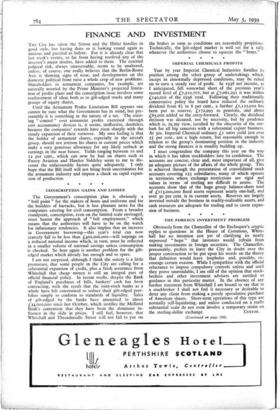CONSCRIPTION GAINS AND LOSSES
The Government's conscription plan is obviously a " bull point " for the makers of boots and uniforms and for the builders of barracks, but is less pleasant news for the companies catering for civil consumption. From a broader standpoint, conscription, even on the limited scale envisaged, must hasten the approach of " full employment," which means that the authorities will have to be on the watch for inflationary tendencies. It also implies that an increase in Government borrowing—this year's total can now scarcely fail to be less than k400,000,000—will impinge on a reduced national income which, in turn, must be reflected in a smaller volume of national savings unless consumption is checked. So here again is another problem for the gilt- edged market which already has enough and to spare.
I am not surprised, although I think the outcry is a little premature, that some people in the City are calling for a substantial expansion of credit, plus a fresh assurance from Whitehall that cheap money is still an integral part of official financial policy. In recent weeks, despite the Bank of England's purchases of bills, bankers' cash has been contracting, with the result that the joint-stock banks as a whole have felt constrained to reduce their gilt-edged port- folios simply to conform to standards of liquidity. Sales of gilt-edged by the banks have amounted to about L34,000,000 since last October, which justifies the Midland Bank's contention that they have been the dominant in- fluence in the slide in prices. I still feel, however, that Whitehall and Threadneedle Street will not fail to put on the brakes as soon as conditions are reasonably propitious. Technically, the gilt-edged market is well set for a rally whenever the authorities choose to squeeze the " bears."














































 Previous page
Previous page